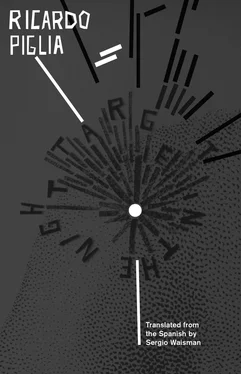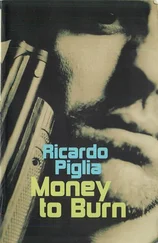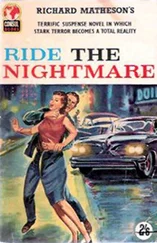The twins’ passion for gambling was the first thing that attracted Durán to them. The sisters were used to betting against each other, and he became part of the game. From that point on he dedicated himself to seducing them — or they dedicated themselves to seducing him. They were always together (dancing, dining, listening to live music) until one of the two would insist on staying a bit longer to have another drink at the bar in the hotel, while the other would excuse herself and go back to the room. He would stay with Sofía; with the twin who said she was Sofía. Everything worked out for a few days.
Then, one night, when he was in bed with Sofía, Ada came in and started undressing in front of them. That was the start of the stormy week they spent in the motels of Long Island’s South Shore, in the freezing winter, sleeping together, the three of them, enjoying the bars in the resorts that were nearly empty in the off-season. The three-way game was hard and brutal and the cynicism was the hardest thing to bear. Perdition and evil make life fun, but conflicts evenutally arise. The two sisters would plot behind Tony’s back and make him say too much; he, in turn, would plot with the women, trying to turn one against the other. Sofía was the weakest, or the most sensitive, and the first to give up. One night she left the hotel and flew back to Buenos Aires. Durán continued traveling with Ada. They went back to the same hotels and to the same resorts, until one night they decided that they, too, would go to Argentina. Durán sent her ahead and came a few days later.
“But did he come for them? I don’t think so. And he didn’t come for the family money, either,” Inspector Croce said, stopping to light his cigar. He leaned against the counter while Madariaga cleaned glasses behind the counter. “He came because he was never at peace, because he couldn’t keep still, because he was looking for a place where he wouldn’t be treated like a second-class citizen. That’s why he came, and now he’s dead. In my time things were different.” The Inspector looked around the tavern, but no one said anything. “We didn’t need a half-Latino, half-mulatto, fake gringo coming here to complicate life for a poor country Inspector like me.”
Croce was born and raised in the area. He became a policeman during Perón’s first government, and had been in charge of the district ever since — except for a brief period after General Valle’s revolution in 1956. The Inspector went gray overnight, that year, when he found out the military had executed the workers who had risen up asking for Perón’s return. The week before the uprising Croce had been rallying the local police stations, but when he learned the rebellion had failed he wandered through the countryside speaking to himself for days, without sleeping. By the time they found him it was already as if he were someone else. His hair white, his head agitated, he locked himself in his house and didn’t come out for months. He lost his post that time, but he was reinstated during Frondizi’s presidency in 1958 and has kept it ever since, despite all the political changes. He was supported by Old Man Belladona who, as they say, always defended him, although they weren’t particularly close.
“They want to catch me slipping up somehow,” Croce said, smiling. “They have me under surveillance. But it won’t work, I won’t let them.”
He was legendary, much loved by all, a kind of general consultant in town. Everyone thought Inspector Croce had a bit of a screw loose, especially when people saw him riding through the countryside in his one-horse cart. Always the lone ranger, he’d detain cattle rustlers and horse thieves, or round up bums and rich kids from the large ranches when they came back drunk from the bars near the port. His style sometimes provoked scandals and grumbling, but he got such great results that everyone ended up thinking that his was the way every country Inspector should behave. He had such extraordinary intuition, he was like a psychic.
“He’s a bit off,” everyone said. A bit off, maybe, but not like Madman Carousel, who circled around town all dressed in white, talking to himself in an incomprehensible tongue. No, a bit off but in another way, like someone who can hear a song in his head but can’t quite play it on the piano. An unpredictable man who ranted at times, had no set rules, but was always right and always remained impartial.
Croce got it right so often because he seemed to see things that others didn’t. He caught a man who had raped a woman, once, because he saw the perpetrator coming out of the same movie theater — twice. It turned out that the man had raped a woman in the theater where God Bless You was playing, but the clue that had led Croce to the arrest hadn’t meant anything to anyone else. Another time he discovered that someone was a rustler because he saw the man taking the early-morning train to Bolívar. If he’s going to Bolívar at that time of day, it’s because he’s going there to sell stolen loot, Croce said. Said and done.
Sometimes they’d call him from one of the surrounding towns to solve an impossible case, as if he were a criminal faith healer. He’d ride over in his one-horse cart, listen to the different stories and testimonies, and come back with the case solved. “The priest did it,” he said once in the case of a set of farm fires in Del Valle. A Franciscan pyromaniac. They went to the parish and found a trunk full of fuses and a can of kerosene in the atrium.
His whole life was dedicated to his job. After a strange love affair with a married woman, Croce remained unattached, although everyone thought he had an intermittent relationship with Rosa, Estévez’s widow, the woman in charge of the town’s archives. He lived by himself on the edge of town, on the other side of the tracks, where the police station operated.
Croce’s cases were famous throughout the province. His assistant, Saldías the Scribe, a student of criminology, had fallen under the Inspector’s spell, too.
“Fact is no one really understands why Tony came to this town,” Croce said, and looked at Saldías.
The assistant took out a little black notebook and reviewed his notes.
“Durán arrived in January, on the fifth of January,” Saldías said. “Exactly three months and four days ago.”

1 The town is toward the south of the province of Buenos Aires, 340 kilometers from the capital. A military stronghold and the location of troop settlements during the time of the Indian Wars, the small town was really founded in 1905 when the railroad station was built, the plots of the downtown area were demarcated, and the lands of the municipality were distributed. In the 1940s the eruption of a volcano covered the plains and the houses with a mantle of ash. The men and women defended themselves from the gray dust by covering their faces with beekeeping and fumigation masks.
2 Investigator was the name used, at the time, for a plainclothes policeman.
On that day, in the still glare of summer, a stranger was seen getting off the northbound express. Very tall, with dark skin, dressed like a dandy, with two large suitcases that he left on the train platform — and a fine leather brown bag that he refused to let go of when the porters approached — he smiled, blinded by the sun, and gave a ceremonial bow, as if that was the way people greeted each other around here. The ranchers and laborers talking in the shade of the casuarina trees responded with a surprised murmur, as Tony — in his sweet voice, in his musical language — looked at the stationmaster and asked where he could find a good hotel.
“Would you be so kind as to tell me, sir, where there might be a good hotel near here?”
Читать дальше













